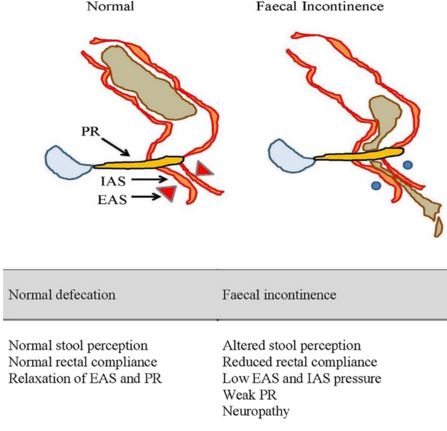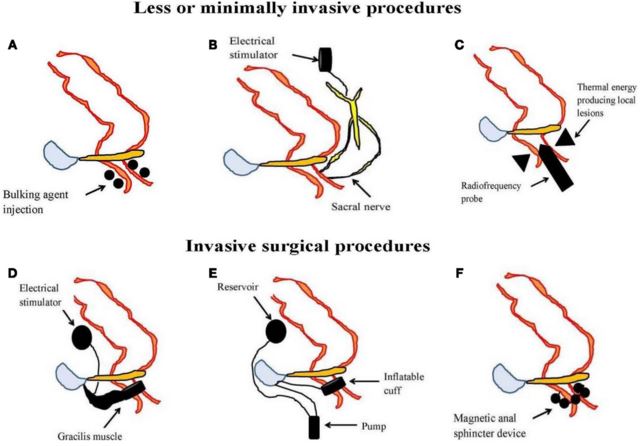What is Fecal Incontinence?
Fecal Incontinence abbreviated as FI is also called bowel incontinence, accidental bowel leakage, anal incontinence or encopresis.

This a common problem generally associated with older adults, where there is loss of bowel control over the manner of defecation, resulting to involuntary moving out of bowel contents such as loose stool elements with mucus secretions, solid fecal material and flatulence of gases.
FI should be considered as a clinical manifestation only and is not a diagnosis. It can happen from a lot of causes and might be observed at the same time when a person has diarrhea or constipation.
Signs and Symptoms of Fecal Incontinence
Fecal incontinence can have a great impact on one’s life as it tends to decrease the mental and physical health; affecting the person’s dealing with the personal, professional and social dimensions of life as a whole.
The emotional effects of FI can lead to fear of public humiliation; feelings of depression, humiliation, anxiety, stress, exhaustion, tearfulness, anger, secrecy, isolation; poor body image, desire for sex with partner is reduced, feeling dirty most of the time; and some embarrassment and frustration.
The quality of life may also be aggravated by the physical signs of the person which are having a bad odor despite some hygienic measures done, the pain due to the discomfort in the perianal area and the soreness of the skin as a result of uncontrollable defecation anytime, anywhere.
Other activities which can be affected by FI are schedules of travel, time to do the usual exercise regimen or shopping days. As such, the person may suffer with social activities that has to be altered, self-image which is negative for the self and others, and relationships which are diminishing in contact and value.
Causes of Fecal Incontinence
Fecal incontinence can occur as a result of muscle damage involving the anal sphincters. Women who underwent vaginal delivery are at risk for FI due to possible anal nerve damage. Individuals who experience surgical procedures of the anus can also have FI when damage to the anal nerves arises.
There are other possible causes of FI and these are:
- Diarrhea as a result of infection or an irritable bowel syndrome
- Radiation therapy that causes rectal damage such as in prostate cancer treatment
- Presence of an impacted stool in cases of severe constipation among older adults
- Nerve damage in cases of spinal cord injury, diabetes mellitus, multiple sclerosis
- Cognitive thinking problem among patients who suffer from a stroke or those diagnosed with Alzheimer’s disease
- Inflammatory bowel disease in cases of ulcerative colitis or Crohn’s disease
- Long term laxative use
- Severe hemorrhoids or problems of rectal prolapse.
- Colectomy procedure or any bowel surgery.
- Having emotional problems.
- Being stressed in an unfamiliar environment.
Special considerations of FI are related to the following:
- For those adults aging from 65 years and above, women tend to encounter more problems with bowel control as compared to the men.
- Children may develop encopresis when they have toilet training problems or having constipation.
- The systematic control of bowel movement is necessary in relation to rhythmic control work done by the rectum, pelvic muscles and the central nervous system.
Individuals with FI are encouraged to share the problem to their attending physicians since it is a treatable problem.
Treatment
Fecal incontinence is considered debilitating to a healthy person’s life both in its social and psychological aspects, but it is very treatable. The treatment success of FI depends upon a thorough assessment of what causes it and how easily this problem is being managed.
The exact treatment of choice relies on the cause and severity of the underlying disease that results to FI, and the general health status and motivation of the person to cooperate in the treatment plan.
Home Care
- Diet modification changes by keeping track of food which can cause FI and eliminate them
- Increase bulk in the diet by adding fiber-rich foods
- Bowel retraining and pelvic floor exercises for anal muscle sphincter control for defecation
- Use of special pads or undergarments when leaving home for some outdoor activities
Surgery
Surgery approaches are done when medical treatment does not work and these are:

- Rectal sphincter repair
- Artificial bowel sphincter
- Fecal diversion
- Gracilis muscle transplant
- Sacral nerve stimulator
- Injection treatment of thick gel
References:
Bowel incontinence care at https://www.nlm.nih.gov/medlineplus/ency/article/003135.htm
Digestive Disorders Health Center : Bowel Incontinence causes, diagnosis & treatment at http://www.webmd.com/digestive-disorders/bowel-incontinence
http://emedicine.medscape.com/article/268674-overview#a8
Gray, M; Beeckman, D; Bliss, DZ; Fader, M; Logan, S; Junkin, J; Selekof, J; Doughty, D; Kurz, P (Jan–Feb 2012). “Incontinence-associated dermatitis: a comprehensive review and update.”. Journal of wound, ostomy, and continence nursing : official publication of The Wound, Ostomy and Continence Nurses Society / WOCN 39 (1): 61–74.
Tadataka Yamada, David H. Alpers, et al., eds. (2009). Textbook of gastroenterology (5th ed.). Chichester, West Sussex: Blackwell Pub. pp. 1717–1744.
Paul Abrams et al., eds. (2009). “Pathophysiology of Urinary Incontinence, Faecal Incontinence and Pelvic Organ Prolapse”. Incontinence : 4th International Consultation on Incontinence, Paris, July 5-8, 2008 (4th ed.). [Paris]: Health Publications. p. 255.

Honestly, I haven’t thought that bowel leakage can lead to so much mental, social, and physical decrease in someone because it would affect so many aspects of their life privately and most especially publicly. It’s alarming that one simple sickness can lead to such great downfall in a person’s life. Luckily, there’s a treatment for it with the help of surgery or home care as you’ve mentioned. Thanks for the informative article about fecal incontinence! http://accidentalsisterhood.com/category/bowel-problems/